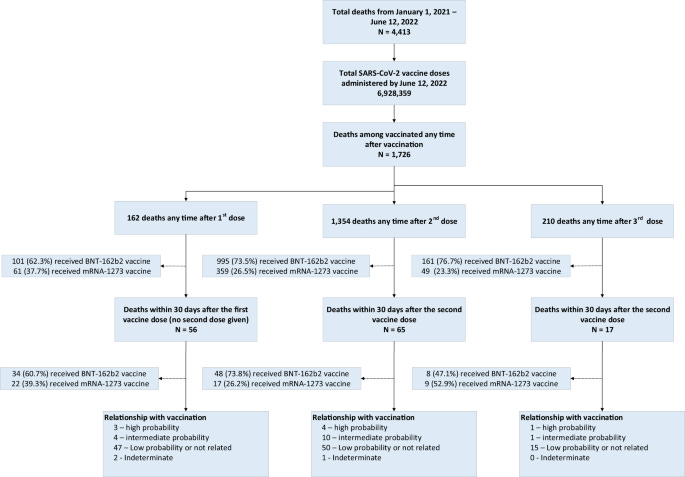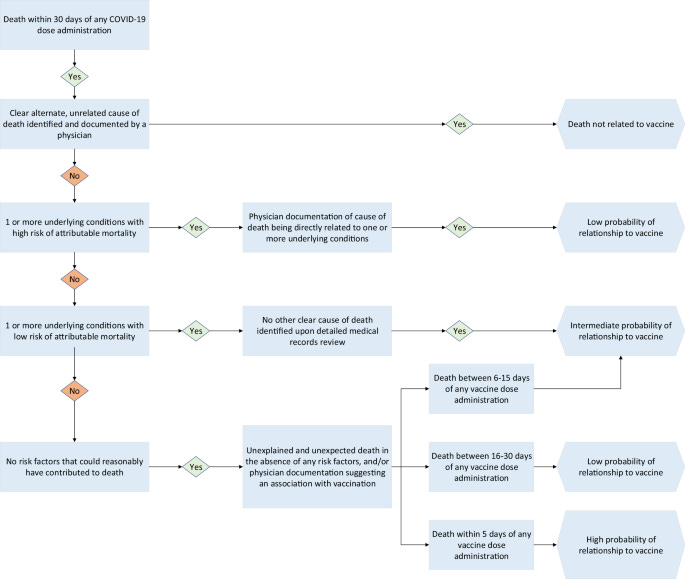A Qatari study, published in ‘Nature’ last week, tried to evaluate the mortality attributable to Covid vaccine administration using national level data. How many deaths did Covid vaccinations cause? The abstract rightly points out that this information is critical in allaying concerns about the vaccine’s safety.
Whilst the study is clearly biased it produces some interesting statistics and leaves some important questions. I say it is biased because it uses phrases such as “despite their demonstrated safety and efficacy” and constantly reiterates how rare vaccines deaths are. This may be the case but is suggests they were looking to reaffirm their beliefs rather than investigating the facts, whatever they may be.
The authors of the study reviewed every death in Qatar that occurred within 30 days of administration of a Covid vaccine between 1 January 2021 and 12 June 2022. 99% of vaccines were mRNA vaccines.
To do this, they started with all deaths (4,413) and removed all unvaccinated deaths, leaving 1,726. With over 90% of Qatar’s population being vaccinated, this suggests that a lot of the removed deaths occurred pre-vaccination. But it would be interesting to know what counts as vaccinated in this study. If, as with many other studies, you are only deemed vaccinated 14 or 21 days after injection then the 2,687 removed unvaccinated deaths would also need examining. But for now, I will ignore that point.
So there were 1,726 deaths which occurred any time after vaccination. From those, they whittled those down to 138 that occurred within 30 days after injection. They then attempted to establish whether there was a high, intermediate or low probability that the deaths had been caused by the vaccine.
If an individual had one or more severe underlying conditions associated with high risk of mortality and their records showed those contributed to their death, they were assigned a low probability. If there were no underlying conditions and no risk factors for death they were assigned a high probability if death occurred within five days of vaccination, intermediate if within 6-15 days and low if between 16-30 days.
The flow chart below shows how they sorted the deaths into the low, intermediate and high categories.
The study found that of the 138 deaths, 8 had a high probability that they were linked to the vaccine (1.15/1,000,000 doses), 15 had intermediate probability (2.38/1,000,000 doses) and 112 had a low probability or no association (3 were indeterminate).
Looking at the supplemental data, of the 112 low probability deaths, 28 deaths are listed meaning the missing 84 are likely to have had no association at all (e.g. road traffic accident). However, many of the 28 deaths are questionable as to whether they should be low probability or not. For example a 21-30 year old with no known comorbidities suffered a cardiac arrest, 22 days after vaccination.
Also, having a co-morbidity probably makes it more likely that you will react badly to a vaccine, so perhaps they shouldn’t be included in the low category. Just because you have a heart problem and you die from a heart problem following vaccination doesn’t mean the original heart problem caused your death. The vaccine could still have caused it by exacerbating your initial heart problem, which wouldn’t have killed you anyway.
They conclude that approximately one in every 100,000 unique vaccine recipients is killed from the vaccine. They attempt to justify this by saying that this rate is lower than the overall crude mortality rate in Qatar, which surely has nothing to do with how dangerous or not a vaccine is.
Taking the study at face value would mean that approximately 50,000 people died (high or intermediate probability) worldwide whilst taking part in the mRNA vaccination experiment. Leaving in the low probability deaths would mean approximately 100,000 deaths.
The median age of the 138 deaths was 55, which is relatively young. This begs the question, how many deaths are acceptable to save lives? Say the vaccine did save millions of lives, are 50,000 or 100,000 deaths an unfortunate consequence of that process that we sadly have to accept?
And would we have accepted them if we had known the death figure up front? Would people have still been injected if they knew 50,000 or 100,000 people would die, if that meant they would be protected from Covid?
Yes, if they were put into a state of fear they would. But if a 55 year old knew their real chance of dying from Covid, would they really accept that risk? I doubt they would, even if the risk was 1,000 people dying or 100.
The study shows that over 15% of all deaths occurring within 30 days of vaccination are likely to have been caused by the vaccine. Include the ‘low possibility’ deaths and that ramps up to over 35%. And this is in relatively young people. How many more deaths can be linked to the vaccine if that time window is extended?
Furthermore, the question of Covid deaths linked to my unvaccinated question above could then be asked. During the study there were 435 Covid deaths, 90% of which occurred in unvaccinated individuals. Many of these Covid deaths occurred around the time of the vaccination roll-out, would these be linked to the vaccine? Were these in ‘unvaccinated’ people who hadn’t reached 14 or 21 days post jab yet?
Pretending that these deaths didn’t occur only makes the matter worse. It causes some people to see every death as caused by the vaccine and it will make a lot of people question public health going forwards. It isn’t strange, conspiratorial or anti-vax to delve into vaccine safety. The complete opposite in fact. But with so many people thinking it is, it clearly reveals the huge, massively funded pharmaceutical lobbying process that is in place to make the general population ignore these crucial questions.






Clearly a ridiculous study. When I looked at ALL CAUSE deaths in UK (where there’s no subjective fiddling around with trying to determine cause of death) it was clear beyond belief that getting a shot put all age groups at a higher chance of dying after a few months. Period.
The data says what they won't say. Also remember recovery in healthy people is 99.8%